- Home
- Rachel Caine
Undone os-1 Page 4
Undone os-1 Read online
Page 4
That would, I thought, be interesting.
I cocked an eyebrow. “I won’t screw it up if you won’t,” I said. “Are you sure you want to work with me?”
His grin surprised me. It changed him completely, made him real and full of secrets. “I like a challenge,” he said. “That’s why they picked me. That, and my work’s really pretty boring. You might liven things up a little. Also, I think I was probably the only one insane enough to say yes.”
I had never had the impulse to laugh. Smile, yes, but laughter was a new thing, and when it bubbled from me, uncontrolled, I was unsettled. So many odd things about living in this flesh.
But somehow, I felt it might not be as bad as I’d feared.
Chapter 3
I’D NEVER EXPECTED that Manny Rocha didn’t live close by. Human distances baffled me, but when he showed me a map of the country—country, another thing to learn; I was a citizen of the United States now, according to the paperwork that Lewis had provided me—I discovered that it was far removed from Florida. As Lewis had warned me, he wanted me well away from Joanne, David, himself, and whatever crisis loomed for them—less, I suspected, from any concern for me than a desire not to trip over me in the heat of battle.
Manny pointed to an almost square state near the center of the map. “That’s New Mexico,” he it „said. “It’s another state. We’re in Florida right now, here.” He tapped the squiggle of irregular lines on the map. “Going here.” His fingers moved a long, long way between the two. “Now, usually I’d fly, but I don’t want you freaking out. Last thing I want to do is deal with you and Homeland Security at the same time.”
Freaking out, I realized, meant “losing control.” I frowned at him. “I will not freak out.”
“Yeah, great. I still think I’d rather drive,” he said.
I looked again at the map. “How many minutes is this drive?” I was still struggling with the concepts of artificial time, but from the look on Manny’s face, I had not struggled hard enough. “Hours?”
“Days,” he said. “That’s a couple of days, lady.”
Days. Trapped in a clanking, stinking metal monster. No. “Is there no other way?”
“Like I said, we could fly, but—”
Flying. I was most comfortable in the air. “Fine.”
“You have to understand, there are rules—”
Everything had rules in the human world. Annoying. “I will not freak out.”
As Manny had supposed, I was wrong about that.
So many rules. I had no baggage, except for a leather bag to carry the identification the Wardens had given me, and a handful of currency that Manny, muttering under his breath, had withdrawn from a machine he’d called an ATM. I had watched the process carefully, then checked the plastic cards that the Wardens provided. I had one with my image imprinted on it that read at the top DRIVER’S LICENSE, which meant I could operate a motor vehicle. Not that I would ever wish to. I had a gold, shimmering card with the image of an ancient goddess on its surface.
“Credit card,” Manny explained, when I held it up. We were standing in line at the airport. “For buying things. But don’t buy things.”
“Then why did I receive one?”
“Because my bosses are crazy?”
I held up the next card.
“Yeah, that’s an ATM card. Somewhere in there, you should have information about your PIN number. That’s like a code you put into the machine. If you have the right code and the right card, you get money. Money comes to you from the Wardens. It’s compensation for the work you do for them.” Did my ears deceive me, or did Manny Rocha seem to resent that? “But you have to pay attention. You can’t pull out more money than you have in the account.”
That seemed straightforward enough. I put the ATM card, credit card, and driver’s license back into my purse, and pulled out a small dark blue booklet with pale blue pages. The inside front cover once again held my image. I stared at it for some time, but the image did not move.
“Passport,” Manny said before I asked. “You need that. Keep it out, along with your tickets.”
All around me, people were waiting. Some stood patiently, some fidgeted, some seethed. Traveling seemed to be a tremendous effort. I began to see why Manny might prefer to drive, despite the horrible, suffocating, noisy box on wheels. The journey would at least be under his control.
I watched the security process with great interest, but despite my study, when it came time for me to copy the actions of those who had gone before me, I found it clumsy and humiliating. I placed my bag in the plastic bin, which rumbled away through the machine—X-ray machine, according to Manny—and slipped off my shoes at the impatient motion from the guard and added those to another bin.
But when I walked through the portal, alarms sounded. I froze, frowning, as two large men in matching clothes came toward me.
“Back up,” one ordered. “Got any metal on you?”
Metal. I looked down at my clothing. I had a belt, yes, with a metal buckle. I removed it.
Alarms again. I felt an unfamiliar pressure in my chest. Anxiety? It was infuriating. These rules were infuriating. I had held power since before the ancestors of these humans had learned to scratch pictographs in rocks, and they were making me feel . . . afraid.
I gritted my teeth and removed my jacket when they ordered it. In my shirtsleeves, with bare feet, I walked through the portal, and no alarms sounded.
The relief was even more humiliating than the anxiety.
Manny Rocha breezed through without a pause, and stopped next to me to pull on his shoes and pick up the bags and detritus from his pockets. “Just remember. Flying was your choice.” He paused a second, then said without looking directly at me, “I thought you’d lose your temper.”
I almost had. “I did not.”
“Yeah. Good. Let’s keep it that way.”
I had been powerful once. Powerful enough to reduce this building to smoking ash. Instead of comforting me, that thought made me feel heavy in my skin, and helpless. Again.
I put on my shoes, belt, and jacket; grabbed my single bag; and followed Manny as he set out down the long, broad, busy hallway.
There were Djinn in the airport.
I don’t know why that came as a surprise to me; it shouldn’t have, but I had not thought there were so many of us walking the earth, much less lingering in this transient place. I waited for Manny to point them out to me, but he seemed oblivious, and when we took our seats in the area designated for our flight, I decided to open the subject.
“Djinn?” he repeated, frowning, and looked around sharply. “Where?”
Ah. So it was true; even the Wardens could not identify a Djinn in human form, if the Djinn wished to remain concealed. That meant that the humans around me, even those who had some bit of Warden ability, saw nothing when they looked at me but a tall, awkward, pale woman with untidy white hair.
No. I was nothing but a tall, awkward, pale woman with untidy white hair. No longer a Djinn. I had to remember that.
I shifted uncomfortably in the hard seat, and tried not to breathe too deeply. Public spaces were filthy with odors, soaked with emotions. It put me on edge.
I pointed to the first Djinn I saw. “There.” He was a plain young man in a red T-shirt and jeans, carrying a backpack, but I caught the flare of his aura. When he turned my direction, I saw a flash of opal in his eyes.
Then he disappeared into the crowd.
Manny was looking at me oddly. “Who?”
There was no point in trying. He wouldn’t recognize a Djinn, not the way I would. I shook my head and shifted again restlessly. I wanted to move, to walk. To feel less caged.
The thought that I would be trapped inside of a small metal box, surrounded by humans and all their odors and noises and emotions, made me feel a little sick. Perhaps we should have driven. I could have opened a window. I understood—Manny had emphasized it to me in forceful language—that I could not do so on the aircraft.
“We got you an apartment,” he was saying. “It’s your home. You’ll stay there when you’re not working. It’s not far from my place, a couple of blocks. Got you a phone, too. You’re on your own for furniture. I’ll give you some catalogs; we get a ton of them.”
He said we. He had said that before. “You don’t live alone.”
Manny glanced at me, then down at the magazine open in his hands. “No. I’ve got a wife, Angela, and a daughter. Isabel. Ibby, for short.”
“Angela,” I repeated. “Isabel. Ibby.”
“They’ve got nothing to do with you.” He said it aggressively, as if I had trespassed on something private. “They’re not Wardens. They’re my family.”
Merely humans, then. I would have no interaction with them. “I have no interest in them,” I said, which I meant to be reassuring. Manny frowned again. “What?”
“I think I need to send you to school or something. You always this unpleasant?”
I gazed at him for a long moment without blinking. “You don’t enjoy flying.”
I had surprised him. “What makes you say—”
“It’s obvious.” I felt my lips curl into a smile. “You strike out at me, but it’s not me you fear.”
“Doesn’t mean you’re not a bitch, Cassie.”
Cassie? “My name is Cassiel.” I glowered at him. That made him smile, and the longer I glared, the wider the smile.
“Okay,” he finally said. “No nicknames. Got it.”
Our staring match was interrupted by a tinny, crackling voice from overhead. Our flight, it seemed, was ready for boarding. I rose gratefully, clutching my ticket, and began to move toward the uniformed attendant.
“Whoa,” Manny said, and grabbed me by the arm. “We’re not—”
I turned on him, snarling. “Take your hand off of me!” I couldn’t abide being touched so suddenly, with such disrespect.
Manny didn’t let go. “Hey. Easy!” His voice was soft, but sharp as a knife. “I told you, no freaking, and I wasn’t kidding. You cause a scene in here, and we both end up in trouble. Relax. I was saying that we’re not first class, so we have to wait our turn.”
There were classes among humans. I’d known there were, of course; I was not totally ignorant of power and structure. But America prided itself on being a free and equal society. I wondered who became first class, and how.
“Money,” Manny said, when I asked. He loosened his grip on me. “Sorry about grabbing, but you’re going to have to remember not to take my head off, okay?”
“Okay,” I said. It wasn’t, but I would have to find a way to make allowances for his impulsive actions.
And my own. This body seemed to have its own set of rules and behaviors, and I was not entirely comfortable in controlling its responses.
I waited in silence while the first class section boarded—I could see no differences, in truth, between Manny and those others, so perhaps it really was a question of money—and then moved forward when he prompted me.
The hallway was narrow, chilly, and reeked of oil and metal. I coughed and tried not to breathe, but that was not possible.
When I reached the rounded door of the aircraft, I had a curious wave of anxiety. It’s so small. And so it was, not only the entrance, but the plane itself—smaller than I’d expected, tremendously fragile in its construction. I am entrusting myself to the care of humans.
“Hey,” Manny said, and put a hand on my shoulder. “Go. You’re holding up the line.”
I didn’t want to do it, but I stepped into the plane. I’d like to say it wasn’t as bad as I expected, but that would be a lie.
I survived the flight in much the same way I’d survived my fall from Djinn grace: by sheer endurance. It was not a pleasant experience. My body was prone to fits of anxiety whenever the plane shuddered in the sky, which was often. My body also constantly complained of aches, pains, discomforts, annoyances, and a persistent need to rid itself of the liquids I compulsively consumed.
When we escaped from the confinement some five hours later, I was unsteady and weak with relief. The air in the jetway seemed clean and refreshing, after breathing the filthy recycled stuff, and the spring of metal and rubber under my feet felt almost joyous.
Leaving the airport was easier by far than I’d expected—we simply walked out, into the hot, dry air. The sun was low on the="6as low horizon, and the sky . . .
... Oh, the sky.
I stopped and stared. I had seen more beautiful things as a Djinn, but never as a human, through human eyes, and the colors of the sunset woke feelings in me I had never known were possible. It made me feel small and yet, somehow, part of something vast and astonishing.
“Home sweet home,” Manny said, and grabbed my arm again. It was a credit to the beautiful display of the sunset that I did not even care. “Let’s go, Cassiel.”
We were only a few steps out of the building when a small human form ran headlong into Manny and clasped him around the knees. “Papa, Papa, Papa!”
I had not known Manny could smile that way—so full of tenderness. “Hey, Ib,” he said, and peeled the child away from his knees to lift her up. She promptly circled his neck with chubby arms, legs wrapping around his waist. A perfectly miniature person, dressed in miniature adult fashion in small blue jeans, an offensively bright shirt, and . . .
Isabel turned her face toward me and smiled, and it was as if the sun had risen new and clean, full of warmth and impartial welcome. She was a lovely child, with skin the color of caramel and eyes of a dark, warm brown. A round little face, surrounded by glossy black curls. “Who’s that, Papa?”
“That’s Cassiel,” he told her. “She’s my new friend. Say hello to her.”
Isabel studied me for a few seconds, still smiling, and then said, “Hello. My papa’s taking me for pizza.”
“Oh, your papa is, is he?” Manny shifted her weight to one hip and gave me a look that invited me to share his amusement. “Tell you what: Let me get Cassiel settled, and then we’ll see. Where’s your mom?”
The child pointed, and there, a few paces away next to a large dark red van, was an older, taller version of Isabel. She had the same long, curling hair, the same smile, but there was a distance to her. She was much more guarded.
She waved. Manny waved back. So did Isabel. “That’s Angela,” Manny said. “Guess she got off work after all.” He stopped for a moment, staring at his wife, and without looking at me, he said, “You understand, I don’t want you putting them at risk. I wasn’t planning for you to meet them on day one, but I guess that’s where we are now.”
I didn’t understand, but I knew he wanted reassurance. “I will not harm your family,” I said stiffly. In truth, they were not Wardens. Their lives meant little to me.
Manny sent me a glance, finally. “All right. Then let’s go.”
Manny had gone only a few feet when he realized I was not following, and turned back with a frown.
“Well?” he asked. “You coming or not?”
I had no choice. Manny was my Conduit, my only survival. I felt like an imposter, but it was better than being alone.
Manny and his family lived in Albuquerque, a town of hills and mountains. Humans had tamed the land, but not subdued it; there was wildness here, and power. I felt the vibration of it in the ancient mountains, in the clear blue sky above.
The structure of their house, on the other hand, was so new as to have no aetheric presence at all. “We just got it about six months ago,” Manny told me as he unlocked the door and held it open for his wife and child. Isabel skipped inside, shoes thundering on the wooden floor. “It’s small, but we like it.” He seemed strangely anxious that I like it, too.
I nodded, unsure what to say. It was a box. Walls, floors, ceilings. Cluttered with bright furniture and toys. Angela picked up some and moved them aside, but not as if she were worried about my opinion; she simply did it automatically. Isabel, seeing her mother’s actions, imitated her, picking up a doll and carrying it by one arm to drop it into a primary-colored box in the corner of the room.
I wondered if I would be expected to do that, as well.
I did not know the protocols, so I stood, watching, as Manny put down his bag and turned on a light next to the sofa. “Living room,” he said. Which I thought was a curious way to refer to it—did they not live in all the rooms? Was there a dying room? “Bedrooms through there. Kitchen. There’s a sunroom on the back, which is nice.”
Manny was nervous. Perhaps it was my stare. I looked away and wandered the room, idly trailing my fingertips over the cold, still pictures in frames. Family. Human family.
“That’s my brother,” he said. “Luis.”
He thought I was looking at the picture that my fingers were touching. I picked up the frame and saw that it held the image of a man, handsome, a little younger than Manny. A stronger jaw, but kind eyes.
“He’s a Warden, too,” Manny said. “You’ll meet him later, maybe. He’s out in Florida right now.”
I put the photo down. “I would like to go now,” I said, which I thought was a polite way to request an end to this. Evidently not. Manny frowned at me.
“You want something to eat first? You do want to eat, right?”
Did I? I supposed I did. Djinn in human form seemed to emulate all human functions equally, and my stomach was growling in frustration. I hadn’t yet mastered the knack of anticipating its needs.
I nodded.
Angela, who’d said very little, patted her daughter on the head and sent her scampering off to play before turning to me. I was struck by her again—a quiet, controlled woman, strong. So closely guarded. “Manny tells me you’re not human,” she said. “Is that right?”
I cocked my head. “I was not born human. I seem to be human enough now.”
Human enough. A frightening statement.
“All right,” Angela said. “I’ve seen Djinn before. I know they’re dangerous. Let me make something clear to you—if you hurt my husband, if you even think about hurting my daughter, I’ll kill you. Understand?”

 Smoke and Iron
Smoke and Iron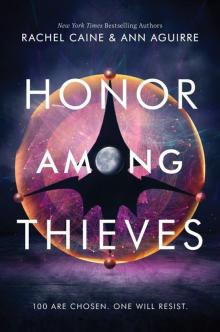 Honor Among Thieves
Honor Among Thieves Paper and Fire
Paper and Fire Ash and Quill
Ash and Quill Wolfhunter River (Stillhouse Lake Book 3)
Wolfhunter River (Stillhouse Lake Book 3) Undone
Undone Glass Houses
Glass Houses Prince of Shadows
Prince of Shadows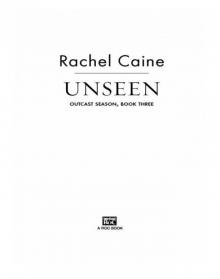 Unseen
Unseen Midnight at Mart's
Midnight at Mart's The Dead Girls Dance
The Dead Girls Dance Last Breath
Last Breath Stillhouse Lake
Stillhouse Lake Daylighters
Daylighters Midnight Alley
Midnight Alley Black Dawn
Black Dawn Fall of Night
Fall of Night Two Weeks Notice
Two Weeks Notice Bitter Blood
Bitter Blood Carpe Corpus
Carpe Corpus Kiss of Death
Kiss of Death Ghost Town
Ghost Town Ill Wind
Ill Wind Fade Out
Fade Out Total Eclipse
Total Eclipse Honor Lost
Honor Lost Thin Air
Thin Air Black Corner
Black Corner Firestorm
Firestorm Bite Club
Bite Club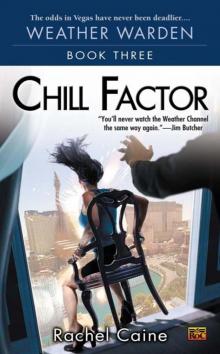 Chill Factor
Chill Factor Windfall
Windfall Oasis
Oasis Devils Bargain
Devils Bargain Terminated
Terminated Feast of Fools
Feast of Fools Lord of Misrule
Lord of Misrule Devils Due
Devils Due Ladies' Night
Ladies' Night Gale Force
Gale Force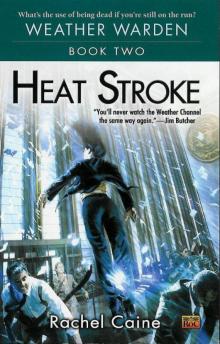 Heat Stroke
Heat Stroke Killman Creek
Killman Creek Sword and Pen
Sword and Pen Cape Storm
Cape Storm Unbroken
Unbroken Windfall tww-4
Windfall tww-4 Heartbreak Bay (Stillhouse Lake)
Heartbreak Bay (Stillhouse Lake) Daylighters: The Morganville Vampires
Daylighters: The Morganville Vampires Duty
Duty Honor Bound
Honor Bound Unseen os-3
Unseen os-3 Firestorm tww-5
Firestorm tww-5 Blue Crush
Blue Crush Devil s Bargain
Devil s Bargain Prince of Shadows: A Novel of Romeo and Juliet
Prince of Shadows: A Novel of Romeo and Juliet Bite Club mv-10
Bite Club mv-10 Terminated tr-3
Terminated tr-3 The Morganville Vampires 14 - Fall of Night
The Morganville Vampires 14 - Fall of Night Bitter Blood tmv-13
Bitter Blood tmv-13 Falling for Grace
Falling for Grace The True Blood of Martyrs
The True Blood of Martyrs Fall of Night (The Morganville Vampires)
Fall of Night (The Morganville Vampires) Devil's Bargain rld-1
Devil's Bargain rld-1 The Morganville Vampires (Books 1-8)
The Morganville Vampires (Books 1-8)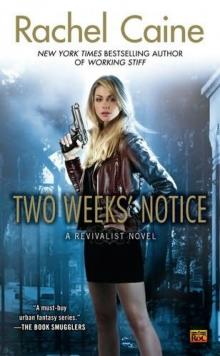 Two Weeks' Notice tr-2
Two Weeks' Notice tr-2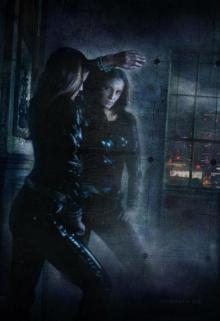 An Affinity for Blue
An Affinity for Blue Caine, Rachel-Short Stories
Caine, Rachel-Short Stories Kiss of Death tmv-8
Kiss of Death tmv-8 WITCHGRAVE
WITCHGRAVE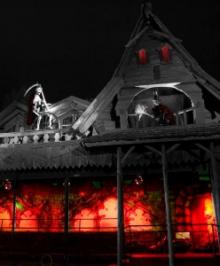 Dark Rides
Dark Rides The Morganville Vampires
The Morganville Vampires Killman Creek (Stillhouse Lake Series Book 2)
Killman Creek (Stillhouse Lake Series Book 2) Midnight Bites
Midnight Bites Line of Sight
Line of Sight![Morganville Vampires [01] Glass Houses Read online](http://i1.bookreadfree.com/i1/03/30/morganville_vampires_01_glass_houses_preview.jpg) Morganville Vampires [01] Glass Houses
Morganville Vampires [01] Glass Houses Black Dawn tmv-12
Black Dawn tmv-12 Midnight at Mart ww-103
Midnight at Mart ww-103 Feast of Fools tmv-4
Feast of Fools tmv-4 Ill Wind tww-1
Ill Wind tww-1 Devil's Due rld-2
Devil's Due rld-2 Black Dawn: The Morganville Vampires
Black Dawn: The Morganville Vampires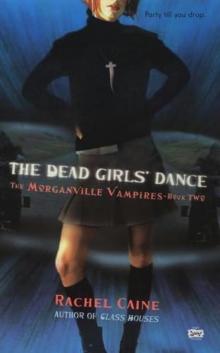 Dead Girls' Dance tmv-2
Dead Girls' Dance tmv-2 Minute Maids
Minute Maids Carpe Corpus tmv-6
Carpe Corpus tmv-6 Total Eclipse tww-9
Total Eclipse tww-9 Ghost Town mv-9
Ghost Town mv-9 Lord of Misrule tmv-5
Lord of Misrule tmv-5 Faith Like Wine
Faith Like Wine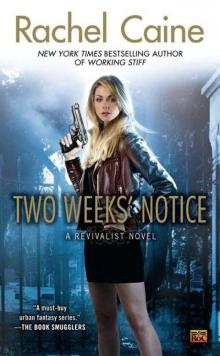 Two Weeks' Notice: A Revivalist Novel
Two Weeks' Notice: A Revivalist Novel Daylighters tmv-15
Daylighters tmv-15 Stamps, Vamps & Tramps (A Three Little Words Anthology)
Stamps, Vamps & Tramps (A Three Little Words Anthology) Unbroken os-4
Unbroken os-4 Unknown os-2
Unknown os-2 4 - Unbroken
4 - Unbroken Cape Storm tww-8
Cape Storm tww-8 Last Breath tmv-11
Last Breath tmv-11 Midnight Alley tmv-3
Midnight Alley tmv-3 Glass Houses tmv-1
Glass Houses tmv-1 Fade Out tmv-7
Fade Out tmv-7 Fall of Night tmv-14
Fall of Night tmv-14 Godfellas
Godfellas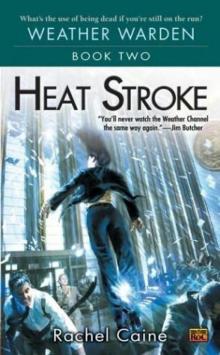 Heat Stroke ww-2
Heat Stroke ww-2 Carniepunk
Carniepunk Oasis ww-102
Oasis ww-102 Gale Force tww-7
Gale Force tww-7 Working Stiff tr-1
Working Stiff tr-1